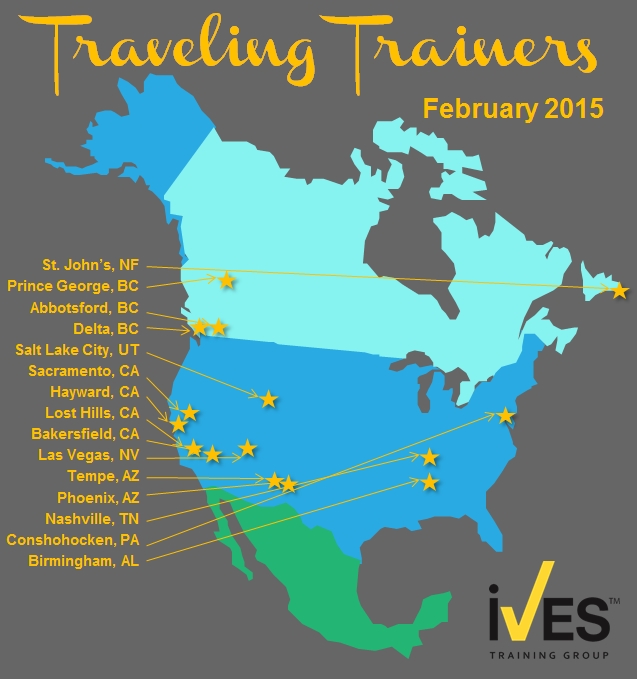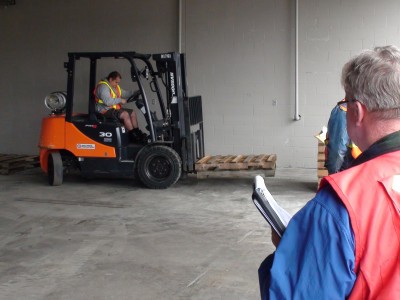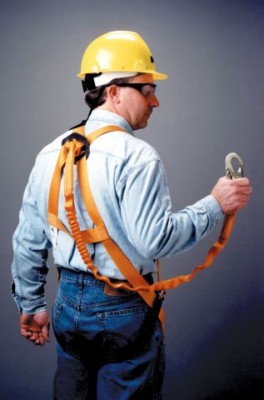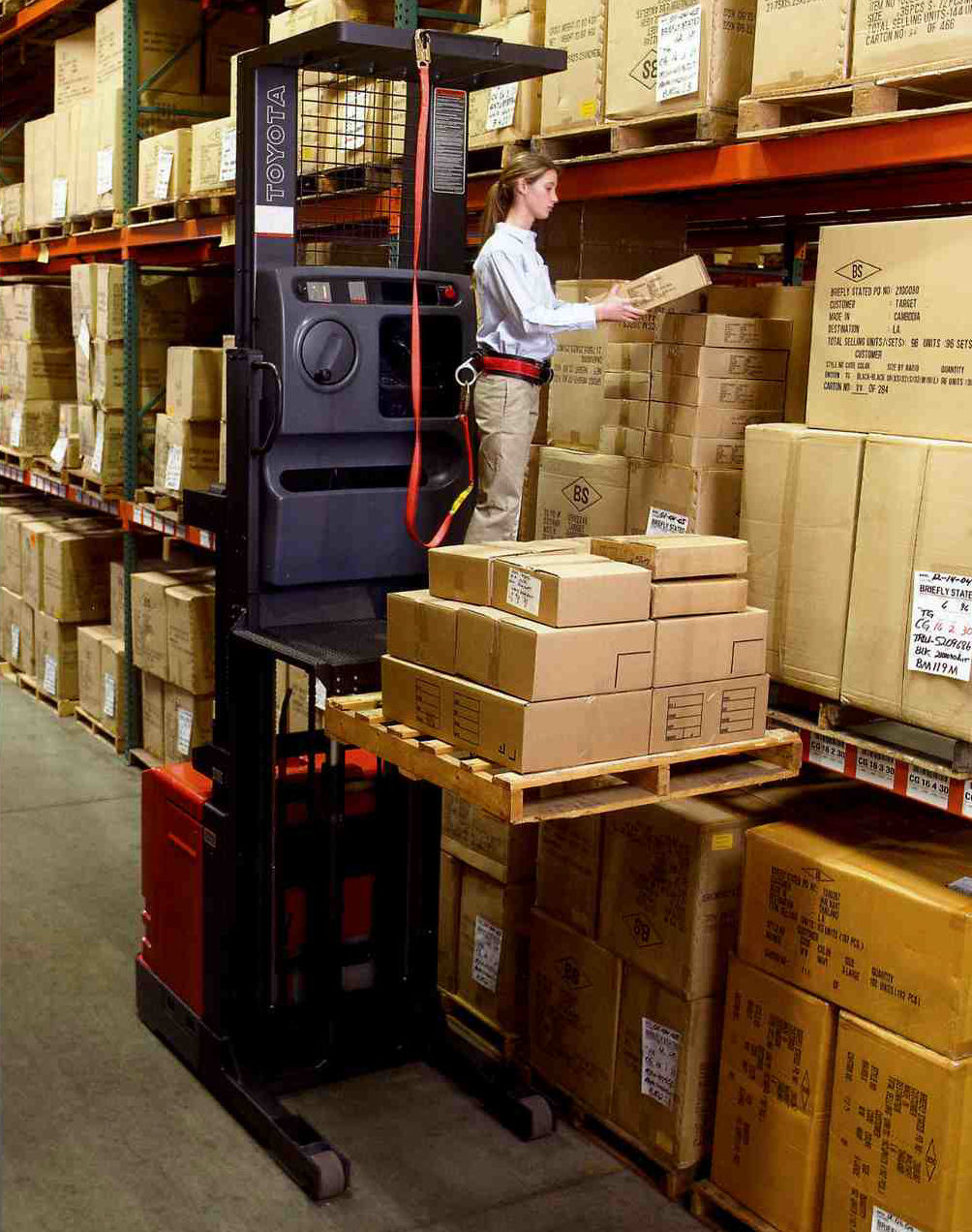Thanks for taking the time to read our newsletter! In this February 2015 IVES Update Newsletter edition we’ll be covering the following:
- Forklift Operator Training: Think Local.
- New training location.
- New standard: B335-15 – Safety standard for lift trucks.
- New downloadable documents.
- A question on fall protection.
- Last chance programs.
- What’s Wrong With This? Answer.
- New items coming soon.
- Interesting articles.
- Incident report: Company directors jailed 25 days for safety violations.
- Upcoming events schedule.
But first, check out all the places where we are delivering training this month…

Forklift Operator Training: Think Local
As any coach in the sporting world will tell you, whether it’s your swing, throw, stroke, or shot; the follow through is every bit as important as the wind-up. In the same vein, any industrial mobile equipment trainer that’s worth their salt will tell you, the job isn’t done until operators have demonstrated competence on the type(s) of equipment they are actually assigned to operate. That is a trainer’s follow through.
 I have noticed a rather frightening trend unfolding out there in which seemingly reputable training providers are doing general training and evaluation but implying that it is specific training. In some cases, these training programs are being delivered off site which right there is a red flag since training must be equipment and site-specific and evaluation must be conducted in the workplace as per federal and state operator training regulations.
I have noticed a rather frightening trend unfolding out there in which seemingly reputable training providers are doing general training and evaluation but implying that it is specific training. In some cases, these training programs are being delivered off site which right there is a red flag since training must be equipment and site-specific and evaluation must be conducted in the workplace as per federal and state operator training regulations.
On the surface nothing appears to be lacking from an employer’s perspective as they are being told that their operators are getting trained and evaluated as they should and that they’re covered, but what is actually happening in many cases is:
- • The initial basic training is too general, in that the number of topics addressed are abbreviated and are not covered to an adequate degree of detail nor is it specific to any particular type of forklift.
- The practical evaluation is conducted using equipment that may or may not be used by the trainee at his or her worksite. Given the amount of variation in the operational design of many forklifts, and the fact that evaluation in the workplace is mandated by regulation (in the US), this can present a high hazard potential not to mention liability for employers.
- The site-equipment-specific training is left to the employer and/or user to deliver after the training provider completes the general training and evaluation. This is just wrong on a number of levels and, in the end, these facts are not conveyed to the employer by the training provider.
- Employers often do not look past the fact that an operator returns to the worksite with a ticket or certificate of some kind which in their minds qualifies the holder to operate anything, regardless of what it was they were evaluated on. This usually means that the specific training never takes place.
- If model specific training and/ or evaluation actually does take place with the returning operator, it is often hastily delivered by unqualified personnel that have no idea of what the operator was trained on or how he/she was told to operate the equipment
I suppose that some training providers are doing things this way because they feel it may bag them more business by appearing to offer a quick and cheap route to qualifying operators, which are always big selling points with busy contractors and employers; but is it really quicker or cheaper? If I am a contractor and I choose to get a bunch of people trained up on a forklift, here’s the way it would play out…
I would round up all of my people that could possibly be directed to operate the unit, or as many of them as I could spare and send them off site for training. They would likely be gone for at least 6-hours, so for all intents and purposes, a full day. When they return the next day, I need to “familiarize” them with the machine(s) they will actually be asked to operate on site. I will also need to bring them up to speed on the local hazards and any site specific rules and company polices related to their job(s).
Now I need to have them evaluated operating the machine they are assigned to, because I want it on record that they have demonstrated competence to a qualified person in the workplace, as per mandatory regulatory requirements – whether the person to whom the operator demonstrates competence to is qualified to evaluate the demonstration is another issue I need to deal with. All of this training and evaluation after the original program delivered by the training provider is time and money out of my pocket and by now I’m feeling pretty frustrated.
Employers could save themselves a lot of time, money and potential grief by making sure they provide site and equipment-specific training regardless of who they choose to deliver it and that performance evaluations are conducted in the workplace using the same type of equipment the operators are actually assigned to operate.
This has been the way it is in the US for the past 15 years now and no federal or state regulatory authority is going to have any compassion for employers that don’t know this. In addition, it’s just the right thing to do to make sure everyone goes home at the end of the day.
Rob Vetter
Director of Training
IVES Training Group
New Training Location!
We are excited to announce that we are now offering Train the Trainer Programs in Virginia!
Here’s what we have scheduled:
- Jun 15-19 Premium Combo Trainer
- Aug 17-18 Express Trainer
- Aug 19-21 Aerial Lifts Trainer
- Oct 12-15 Premium Forklift Trainer
- Oct 16 Trainer Recertification
Call 1-800-643-1144 to register – it will likely be the most cost effective educational choice you make all year!
New: B335-15 – Safety standard for lift trucks
This is the third edition of CSA B335, Safety standard for lift trucks. It supersedes the previous editions- published in 2004 and 1994. This Standard specifies the key elements of a lift truck safety program and also provides recommended qualifications for lift truck trainers and maintenance technicians and personnel.
This edition of CSA B335 has been updated and harmonized with design, classification, and maintenance requirements of ANSI/ITSDF B56.1 and ANSI/ITSDF B56.6.
This Standard applies to Class 1, 2, 3, 4, 5, and 7 powered lift trucks – their design, operation, and maintenance. In addition, certain clauses apply to Class 6 vehicles, non-powered high-lift trucks, and personnel and burden carriers.
The purpose of this Standard is to promote lift truck safety and minimize the risk of injury to workers by specifying the essential elements of a lift truck safety program and prescribing requirements with respect to lift truck design and construction, maintenance and inspection, safe operation, and operator training.
This Standard also outlines recommended qualifications for trainers and maintenance technicians.
For more details visit CSA Group.
Changes to Forklift Recertification Materials
 Don’t panic! We aren’t changing the forklift operator recertification materials you’ve come to know and love – we are simply making them easier for you to order. Each equipment-specific Recertification Package will now automatically come with the 8 matching study guides. Here’s what the new packages are called:
Don’t panic! We aren’t changing the forklift operator recertification materials you’ve come to know and love – we are simply making them easier for you to order. Each equipment-specific Recertification Package will now automatically come with the 8 matching study guides. Here’s what the new packages are called:
- Counterbalanced Forklift Recertification Package
- Narrow Aisle Forklift Recertification Package
- Powered Pallet Truck Recertification Package
- Rough Terrain Forklift Recertification Package
Ask Bob
 Q: Does OSHA require employees to wear a harness and lanyard when raised up on a scissor lift? What about when they are in a forklift cage?
Q: Does OSHA require employees to wear a harness and lanyard when raised up on a scissor lift? What about when they are in a forklift cage?
A: There is no specific OSHA requirement for the use of personal fall protection systems by scissor lift operators unless the guardrails are removed or lowered. However, on rare occasions, some manufacturers may require it so be sure to take a look in the manufacturer’s operating manual as OSHA could use it as a guideline if they should have any reason to investigate.
Regarding the forklift-mounted work platforms I would suggest checking the forklift manufacturer’s information on this as once again there is no direct OSHA requirement for personal fall protection provided that an approved platform is used with the guardrails in place. In fact, in my experience this sort of thing is often a company/site policy so have a look at those if you can. Just remember that if the manufacturer prohibits using a basket or requires personal fall protection in order to do it, always do as they say.
Finally, if operators use a fall arrest system be sure that they are trained and know what they are doing and that the system used will actually stop a fall before they hit the ground or a lower surface. This can be tricky because the height of the platform can vary quite a bit.
Last Chance Programs!
Lots of programs to choose from, but we have limited seats available. Click for more details:
US Programs
Salt Lake City, Utah
Premium Combo Trainer Feb 23-27
Premium Forklift Trainer Mar 23-26
Trainer Recertification Mar 27
Rancho Cucamonga, Southern California
Premium Combo Trainer Mar 2-6
Premium Forklift Trainer Mar 16-19
Trainer Recertification Mar 20
Sacramento, California
Premium Combo Trainer Mar 9-13
Express Forklift Trainer Mar 16-17
Aerial Lifts Trainer Upgrade Mar 18
Loader Group Trainer Mar 23-27
Express Forklift Trainer Apr 8-9
Trainer Recertification Apr 10
Tukwila, Washington
Premium Forklift Trainer Apr 13-16
Trainer Recertification Apr 17
Bismarck, North Dakota
Premium Combo Trainer Apr 20-24
Canadian Programs
Abbotsford, British Columbia
Express Forklift Trainer Mar 11-12
Trainer Recertification Mar 13
Premium Forklift Trainer Mar 16-19
Rough Terrain Forklift Trainer Upgrade Mar 20
Aerial Lifts Trainer Mar 25-27
Express Skid Steer Loader Trainer Mar 30-31
Oshawa, Ontario
Premium Forklift Trainer Mar 23-26
Trainer Recertification Mar 27
Saskatoon, Saskatchewan
Premium Combo Trainer Apr 20-24
Prince George, British Columbia
Express Skid Steer Loader Trainer Apr 27-28
Express Forklift Trainer Apr 29-30
Trainer Recertification May 1
Looking for more dates? View our calendar!
Coming Soon!
Over the next few months we will soon be releasing some new safety items, including forklift accessories, lock-out tag-out materials and personal protective equipment. We will also be releasing our Introductory Series of videos in Spanish. And last, but not least, we are introducing a new stability model called the CASTLE Multifunction Model. Stay tuned, availability and pricing will be available soon!
Answer to Last Month’s WWWT?
In last month’s photo, you can see there are plenty of things wrong to note. The equipment was left unattended (no operator) with an elevated mast/load. Personnel in the box appear to be using it as an elevated work platform which is not approved for use, attached to the machine or built to spec. The “platform” occupant is exposed to a fall that required the use of a fall protection system. The load is elevated in an area where personnel could pass underneath it and over a roll up door that could be opened from the other side exposing personnel to the hazard of being under an elevated load. There should be an operator at the controls and nobody should be standing in/on the elevated load/platform.
Have an interesting photo that you think your fellow trainers would like to see? Send it in!
Interesting Articles
- A Cost of Doing Business vs Increased Profits… more
- Electric pallet jack battery safety tips… more
- Most cited OSHA standards and their cost to businesses… more
- MOL: Mobile equipment and visibility hazards at industrial workplaces… more
- WSBC: Alternate means of escape – purpose-built window breaking device… more
- Three construction workers injured in fall from aerial lift… more
- Two workers injured as rebar collapse topples scissor lifts… more
- One dead in Springfield, Tennessee forklift accident… more
- Worker hit when concrete beam fell off telehandler forklift… more
- Forklift-related fatality leads to $150,000 fine… more
- Company cited in death of worker in trench collapse… more
- OSHA investigating excavator roll over incident… more
Incident Reports
 BRAMPTON, Ont. — Two company directors have been jailed after pleading guilty to safety violations that led to the death of a warehouse worker.
BRAMPTON, Ont. — Two company directors have been jailed after pleading guilty to safety violations that led to the death of a warehouse worker.
Baldev Pura and Rajinder Saini — both directors of New Mex Canada — were sentenced to 25 days in jail. And New Mex Canada, an importer and retailer of furniture and accessories, has been fined $250,000.
On Jan. 18, 2013, a worker was moving merchandise in a Brampton, Ont., warehouse using a combination forklift / operator-up platform called an order picker. The order picker had been modified and had an additional platform supported by the forks which did not have a guard rail around it, and the worker wasn’t wearing fall protection or safety shoes.
The worker was found on the floor and was pronounced dead of blunt force trauma to the head.
A Ministry of Labour investigation found multiple violations of Ontario’s Occupational Health and Safety Act and of Ontario Regulation 851, which covers industrial workplaces. Pura and Saini were both charged with failing as directors of New Mex Canada to take reasonable care that the corporation complied with the Occupational Health and Safety Act and with Regulation 851.
In addition to the 25 days in jail — to be served on weekends — both were ordered to take a health and safety course within the next 60 days.
New Mex Canada pleaded guilty to failing to provide information, instruction and supervision to a worker regarding fall protection and / or working from a height. The company also pleaded guilty to failing as an employer to ensure the safety measures required by law were carried out.
Source: Canadian Press
Upcoming Events
We will be exhibiting at the following conferences in 2015:
- Safety 2015 Professional Development Conference & Exhibition. Dallas, TX. Jun 7-10
- NSC Congress & Exposition. Atlanta, GA. Sept 26-Oct 2
Make sure you stop by and have a chat with our trade show team!
Client Testimonials
“Best training I have received so far! Thank you for not just teaching us how to task train people, but to be effective leaders and coaches. Hope to get more training from you in the future.” Jeff, Lehigh Southwest Cement Co.
“It is a great course to make you more aware how important training is for overall safety!” William, Dominion Diamonds.
“The course was very well one of the best laid out courses I have had the privilege of taking.” Chris, Air North.
Did you enjoy this newsletter? Sign up for our newsletter to receive more like this!